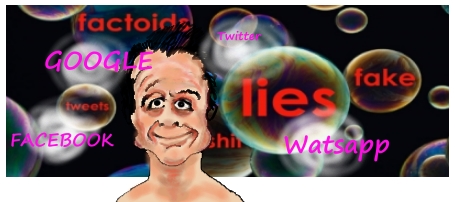1984 revisited (again)
Sunday 29 January 2017

.
Orwell may have been ahead of his time in envisaging the 'telescreen', but the idea of the internet, indeed, of modern communications technology in general, seems to have been outside his wildest imaginings. By chance, the first appearance of a global communications system in fiction, so far as I know, appears in William Gibson's Neuromancer, which was published in ... 1984! This clever SF novel features a 'matrix' which interconnects all computer systems, which software cowboys surf through direct sensory perception. Not quite the same as our own dear Web, but we're getting there.
Basically, Orwell's 'telescreen' is very limited. It may be two-way, but the 'receive' function appears to have only one channel comprising Party propaganda; and the 'send' function is only concerned with surveillance. The idea of two-way communication is irrelevant - the system exists solely for the purposes of the Party. Clearly, contemporary information technology, in all its variations from laptop to smart phone, is designed to serve the myriad purposes of individuals. Its inherent nature, then, makes it very hard to control in the absolute style of Big Brother - as even the Chinese government has found, to say nothing of hacking attacks in the US.
This is not to say, however, that IT does not provide a vast range of means of social control; I only argue that Big Data is not the same as Big Brother. For one thing, the fearsomely complex algorithms of Big Data are not ideological - they can be used by ideology, but in themselves they purely observe and categorise behaviour. For another thing, the essence of Big Data is that it is very big - the real, detailed behavior of each individual is a speck in a vast sand storm. So, Big Data may seek to change the landscape of communication around us ... but how we respond to that is down to us as individuals.
My thesis, then, is that we are not helpless doomed victims of an all-powerful Big Brother. There are indeed wannabe Big Brothers out there, but the modern world is too vast, too complex, too interconnected for them to handle efficiently ... provided, that is, that we stay alert and pay close attention to how such BBs, from megalomaniac politicians to number-crunching global companies, try to manipulate us.
Such manipulation comes through the main, globally-popular software systems, so we should be aware of what those systems can do to us ... as well as what they can do for us. Let's take the four most common:-
Google ... the playground of Big Data, which tends to create 'echo-chambers' where we only see the sort of thing that we have looked at before - so we should deliberately work to search outside our own habits and prejudices
Facebook ... the pool of Narcissus, where we can be seduced to believe that the fictional self that we create is actually the real one - so we should aim to include a bit of the downside as well as the stuff that makes us look good (if we want to go in for self-advertisement in the first place, of course)
Twitter ... the intravenous feed of indoctrination, so beloved of Donald Trump - so we should make sure that we receive Tweets even from sources we despise, like the Daily Mail for instance (or restrict ourselves to dedicatedly balanced news sources)
Watsapp ... the closest thing to real conversation, about the real world, but still prone to banal self-advertisement - so we should make sure that what we send is likely to be genuinely worth the while of whoever is receiving the message, and not just woffle to reassure ourselves that we still matter
And if the great and good George Orwell was to start a novel today, entitled, say '2071', what would he make of all this?

